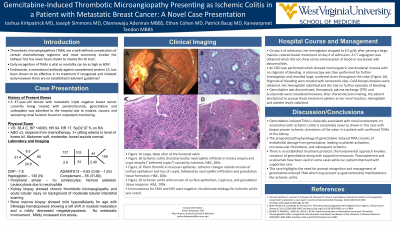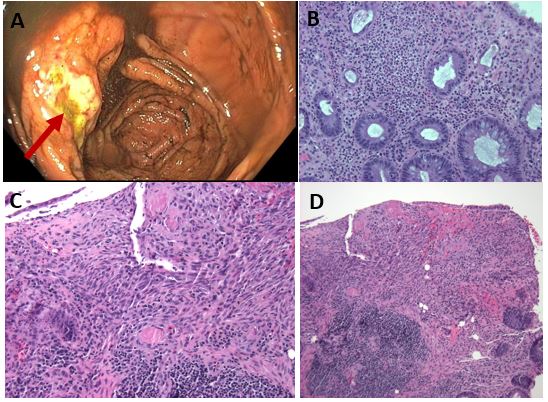Monday Poster Session
Category: Colon
P2096 - Gemcitabine-Induced Thrombotic Microangiopathy Presenting as Ischemic Colitis in a Patient with Metastatic Triple Negative Breast Cancer: A Novel Case Presentation
Monday, October 28, 2024
10:30 AM - 4:00 PM ET
Location: Exhibit Hall E

Has Audio

Joshua kirkpatrick, MD
West Virginia University
Morgantown, WV
Presenting Author(s)
Joshua kirkpatrick, MD1, Joseph Simmons, MD1, Olanrewaju Adeniran, MBBS2, Ethan M.. Cohen, MD1, Patrick Bacaj, MD1, Kanwarpreet Tandon, MD2
1West Virginia University, Morgantown, WV; 2West Virginia University School of Medicine, Morgantown, WV
Introduction: Gemcitabine is a commonly used chemotherapeutic agent which has been associated with thrombotic microangiopathy (TMA). TMA usually presents as hemolytic uremic syndrome with renal involvement or thrombocytopenic thrombotic purpura with neurologic symptoms. This case presents a novel manifestation of gemcitabine-induced TMA leading to ischemic colitis in a patient undergoing treatment for metastatic triple negative breast cancer.
Case Description/Methods: We describe the case of a 47-year-old female with a history of metastatic triple negative breast cancer. Her chemotherapy consisted of carboplatin, gemcitabine, and pembrolizumab. Following six cycles of treatment, she developed worsening renal function attributed to immunotherapy-associated nephritis, which lead to the discontinuation of pembrolizumab. Subsequently, she was admitted to the hospital due to malaise, nausea, and deteriorating kidney function. Hemoglobin was 7.5 gm/dl on admission which further dropped to 6.5 gm/dl after a large, maroon bowel movement. A CT angiogram did not show active extravasation of blood or bowel wall abnormality. Colonoscopy was performed for further investigation and revealed large, scattered ulcers throughout the colon (Figure 1A). Biopsies revealed fragments of ulcerated colonic mucosa with acute inflammation, hemorrhage, and atrophic crypts, suggestive of ischemic colitis. Capillary blood vessels demonstrated fibrinoid changes and fibrin microthrombi, indicating TMA leading to ischemic colitis (Figure 1B, C). Immunostains for CMV and HSV were negative. No alternate etiology for ischemic colitis was noted.
Discussion: Gemcitabine induced TMA, a type of drug induced microangiopathy, is an exceedingly rare condition with no established treatment protocol. Although TMA is a previously recognized complication of gemcitabine therapy, its association with ischemic colitis is completely novel. The proposed pathophysiology of gemcitabine induced TMA consists of endothelial damage from gemcitabine, leading to platelet activation, microvascular thrombosis, and subsequent ischemia. The fundamental approach to treatment involves cessation of gemcitabine along with supportive measures. Although plasmapheresis and eculizumab have been used in some cases, our patient improved with supportive care. This case highlights the need for prompt recognition and management of gemcitabine-induced TMA to mitigate morbidity and improve outcomes in patients presenting with gastrointestinal manifestations like ischemic colitis.

Disclosures:
Joshua kirkpatrick, MD1, Joseph Simmons, MD1, Olanrewaju Adeniran, MBBS2, Ethan M.. Cohen, MD1, Patrick Bacaj, MD1, Kanwarpreet Tandon, MD2. P2096 - Gemcitabine-Induced Thrombotic Microangiopathy Presenting as Ischemic Colitis in a Patient with Metastatic Triple Negative Breast Cancer: A Novel Case Presentation, ACG 2024 Annual Scientific Meeting Abstracts. Philadelphia, PA: American College of Gastroenterology.
1West Virginia University, Morgantown, WV; 2West Virginia University School of Medicine, Morgantown, WV
Introduction: Gemcitabine is a commonly used chemotherapeutic agent which has been associated with thrombotic microangiopathy (TMA). TMA usually presents as hemolytic uremic syndrome with renal involvement or thrombocytopenic thrombotic purpura with neurologic symptoms. This case presents a novel manifestation of gemcitabine-induced TMA leading to ischemic colitis in a patient undergoing treatment for metastatic triple negative breast cancer.
Case Description/Methods: We describe the case of a 47-year-old female with a history of metastatic triple negative breast cancer. Her chemotherapy consisted of carboplatin, gemcitabine, and pembrolizumab. Following six cycles of treatment, she developed worsening renal function attributed to immunotherapy-associated nephritis, which lead to the discontinuation of pembrolizumab. Subsequently, she was admitted to the hospital due to malaise, nausea, and deteriorating kidney function. Hemoglobin was 7.5 gm/dl on admission which further dropped to 6.5 gm/dl after a large, maroon bowel movement. A CT angiogram did not show active extravasation of blood or bowel wall abnormality. Colonoscopy was performed for further investigation and revealed large, scattered ulcers throughout the colon (Figure 1A). Biopsies revealed fragments of ulcerated colonic mucosa with acute inflammation, hemorrhage, and atrophic crypts, suggestive of ischemic colitis. Capillary blood vessels demonstrated fibrinoid changes and fibrin microthrombi, indicating TMA leading to ischemic colitis (Figure 1B, C). Immunostains for CMV and HSV were negative. No alternate etiology for ischemic colitis was noted.
Discussion: Gemcitabine induced TMA, a type of drug induced microangiopathy, is an exceedingly rare condition with no established treatment protocol. Although TMA is a previously recognized complication of gemcitabine therapy, its association with ischemic colitis is completely novel. The proposed pathophysiology of gemcitabine induced TMA consists of endothelial damage from gemcitabine, leading to platelet activation, microvascular thrombosis, and subsequent ischemia. The fundamental approach to treatment involves cessation of gemcitabine along with supportive measures. Although plasmapheresis and eculizumab have been used in some cases, our patient improved with supportive care. This case highlights the need for prompt recognition and management of gemcitabine-induced TMA to mitigate morbidity and improve outcomes in patients presenting with gastrointestinal manifestations like ischemic colitis.

Figure: Figure 1A Large, deep ulcer at the ileocecal valve
Figure 1B Ischemic colitis characterized by neutrophilic infiltrate in lamina propria and crypt atrophy (“withered crypts”) caused by ischemia. H&E, 200x
Figure 1C Fibrin thrombi in mucosal capillaries. Ischemic changes include erosion of surface epithelium and loss of crypts, followed by neutrophilic infiltration and granulation tissue formation. H&E, 200x
Figure 1D Ischemic colitis with erosion of surface epithelium, crypt loss, and granulation tissue response. H&E, 100x
Figure 1B Ischemic colitis characterized by neutrophilic infiltrate in lamina propria and crypt atrophy (“withered crypts”) caused by ischemia. H&E, 200x
Figure 1C Fibrin thrombi in mucosal capillaries. Ischemic changes include erosion of surface epithelium and loss of crypts, followed by neutrophilic infiltration and granulation tissue formation. H&E, 200x
Figure 1D Ischemic colitis with erosion of surface epithelium, crypt loss, and granulation tissue response. H&E, 100x
Disclosures:
Joshua kirkpatrick indicated no relevant financial relationships.
Joseph Simmons indicated no relevant financial relationships.
Olanrewaju Adeniran indicated no relevant financial relationships.
Ethan Cohen indicated no relevant financial relationships.
Patrick Bacaj indicated no relevant financial relationships.
Kanwarpreet Tandon indicated no relevant financial relationships.
Joshua kirkpatrick, MD1, Joseph Simmons, MD1, Olanrewaju Adeniran, MBBS2, Ethan M.. Cohen, MD1, Patrick Bacaj, MD1, Kanwarpreet Tandon, MD2. P2096 - Gemcitabine-Induced Thrombotic Microangiopathy Presenting as Ischemic Colitis in a Patient with Metastatic Triple Negative Breast Cancer: A Novel Case Presentation, ACG 2024 Annual Scientific Meeting Abstracts. Philadelphia, PA: American College of Gastroenterology.
